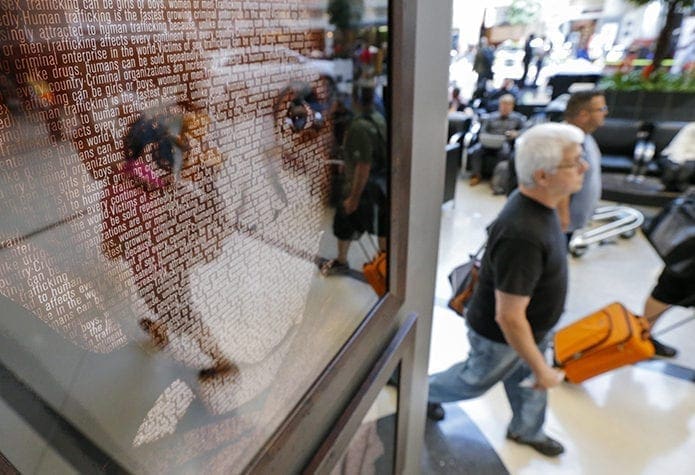 CNS photo/Erik S. Lesser, EPA
CNS photo/Erik S. Lesser, EPADecatur
Airline worker brings trafficking victims’ faces into plain view
By JEAN DRISKELL, Special to the Bulletin | Published May 19, 2017
DECATUR—The exploitation of girls and boys, women and men in human trafficking is not a remote problem but is occurring in front of people everywhere, said Donna Hubbard, who trains airline personnel to recognize trafficking victims.

Donna Hubbard
“Human trafficking is a $150 billion business, second only to drugs and weapons,” Hubbard said in a March 21 meeting of Sts. Peter and Paul Church Women’s Council, in Decatur.
“It is modern day slavery and unfortunately it doesn’t happen somewhere else. It happens right here,” she said.
“I think it is important to know that it can happen to anybody,” Hubbard said, “but you can be a part of the solution. You don’t have to go looking for human trafficking situations. It is everywhere. Be aware of what is going on around you.”
“It’s a community effort,” she said. “It is important to recognize it and report it because that is what saves lives.”
The statistic from the International Labor Organization includes forced labor and slavery in addition to sex trafficking.
Hubbard founded the nonprofit Woman at the Well Transition Center in metro Atlanta in 1994 to help women coming out of prison and to do street intervention with trafficked girls and women. She says she did so after her own life was rescued. She says that her descent as a young woman into a life of abuse, addiction, gang victimization and violence finally ended when she was sentenced to federal prison, where she was able to escape that world and also was brought to know Jesus Christ through the ministry of two women evangelists. She also began to study.
In the past two years, she has worked with Airline Ambassadors International as a certified trainer in human trafficking awareness and is a flight attendant herself.
Some lured by promise of job
“So what is human trafficking?” Hubbard asked. “Human trafficking is the act of recruiting, transporting, transferring, harboring through the use of force, fraud or coercion.”
Unlike human smuggling, where someone pays another to be transported across a border, “trafficking is exploitation-based,” Hubbard said.
“Labor—not sexual exploitation—trafficking is the most common,” she said.
One path is when people in remote areas are told a job is waiting for them in a foreign country and no experience is necessary. They come to the United States or the United Kingdom and only then find out they have to work to pay the trafficker for the airline ticket, housing and food. The trafficker holds their passports and IDs and tells them that until they pay for everything, they will not be able to leave. Those people have been trafficked and realize they will never get out of this situation, she said.
“There are four times more slaves in human trafficking today than there were during (the time of) slavery,” Hubbard said.
In 2014, Hubbard found that 2,000 girls were trafficked into the United States every month just from Nigeria.
Human trafficking is “often not a matter of being kidnapped,” Hubbard said.
In some countries you give the trafficker your daughter and they won’t kill the rest of the family or give them your son in exchange for money to take care of the rest of the family, she said.
Runaways are most vulnerable
She spoke at length of the sex trafficking victims.
“One of the biggest, fastest ways girls are trafficked … are runaways,” Hubbard said. “They are vulnerable.”
The average age of victims is 14 and a half, she said, when they think no one understands them except their boyfriends.
Often a girl meets a boy online and thinks he understands her, not realizing he is an older person manipulating her.
She said that, once victimized, girls become “trapped through fear … afraid to leave … shamed. This is the big secret.”
“It happens in our public school systems. There are boys selling girls underneath the steps, in the bathrooms, at the high schools, they are selling them,” Hubbard said.
Many times the girls or boys are told not to tell anyone or their family will be hurt or killed, she said.
“Effects of trafficking,” Hubbard said, “are that people are commodities. Traffickers do not see this sweet little girl or this wonderful young man. They see how many times they can sell or rent this person. They see a way to make money.”
Those who are vulnerable range from migrants to young men and women traveling alone, even sons and daughters who want to travel after graduation or on spring break.
Other victims are “people with mental health and substance abuse issues, refugees of disasters or political unrest, and children from illegal adoptions,” Hubbard said.
“One hundred thousand children are at risk of being trafficked in the United States and yet there are fewer than 3,000 beds in the United States to take in human trafficking survivors,” she said. “Eighty-three percent of the victims and 66 percent of the traffickers are right here in the United States.”
The impact of trafficking can be long-term physical damage, Hubbard said. “There are infectious diseases, STDs, permanent scarring on your arms and your bodies and mutilations from physical abuse.”
She said psychological issues last for years, including substance abuse and eating disorders.
Hubbard also said that survivors, those who are rescued, need to be embraced, to feel that they are part of a community, are part of the human race and are worth something, not trash or garbage.
Signs of possible trafficking
Hubbard mentioned several situations where flight attendants met victims. One flight attendant talked to a group of girls coming from Moscow to Chicago. They believed they were going to be actresses but were not signed with any agency. They did not know who was going to meet them or where they were actually going, she said.
She also said that there were times when three or four flight attendants at different times asked a question of a group of people or a couple with a child that they were not very attentive to, and each flight attendant got a different answer.
Pointing out telltale details, she said victims of human trafficking may be nervous around law enforcement or anyone in an uniform. They may avoid eye contact.
“They (the victims) may not talk to you, they may have bruises on their bodies, they may be drugged and they usually are,” Hubbard said. “They may seem disoriented or malnourished.”
She said tattoos and bar codes are ways girls are identified in airports around the world.
“People who are there to purchase them identify them by the tattoos,” Hubbard said, but “not all tattoos are signs of human trafficking.”
She encouraged her audience to be observant and notify law enforcement quickly, but discreetly, if someone seems to be a possible trafficking victim.
“You have your phone. If you see something, say something,” Hubbard said. “Be very descriptive, detailed, and tell where you are. It does not matter if you are wrong. What is most important is that you report it.”
“Contact local or national law enforcement. Provide information as quickly as possible, not when you get home,” Hubbard said.
She strongly cautioned not to intervene yourself or make your suspicions obvious.
“Don’t confront anybody,” she said. “That jeopardizes your safety or anyone else’s. Don’t display alarm, then you could jeopardize yourself and could also jeopardize the victim.”
“Don’t try to rescue anybody, you will endanger yourself or anyone else,” Hubbard said. “If you are not sure, ask someone else, what does this look like to you.”
“Maintain control of your circumstances,” she said. “That means if you think that the traffickers know, get yourself to a safe place.”
Hubbard said that Airline Ambassadors International has a free TIP app, which can be downloaded. “It has a locator on it, a recorder, camera, a video, and a way to take notes.”
For information on the Airline Ambassadors International human trafficking awareness programs and their TIP app, visit airlineamb.org.